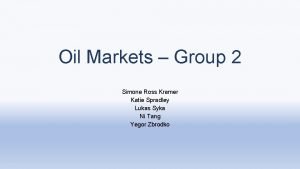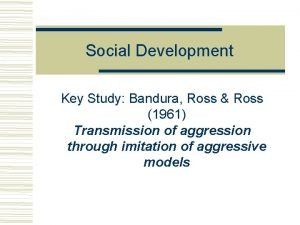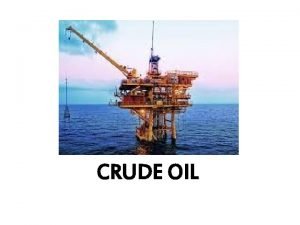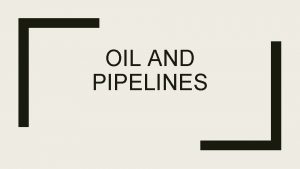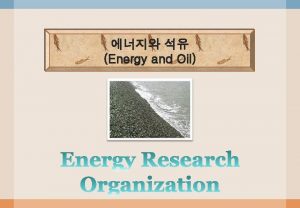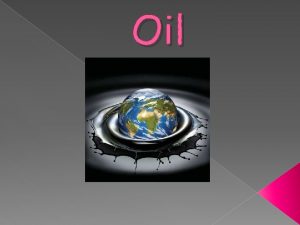Oil Markets Group 2 Simone Ross Kramer Katie














- Slides: 14

Oil Markets – Group 2 Simone Ross Kramer Katie Spradley Lukas Syka Ni Tang Yegor Zbrodko

The Gamechangers? Major Factors Affecting Oil Prices Supply and Demand $ Costs of Production Geography & Geopolitics Crude Oil Quality

Video The Long and The Short of It: A Bull's Case for Oil

Is OPEC Still a Game Changer? Organizational Trouble • 2016 - Failure to reach agreement at The Doha Summit • 2015 - Iraq leads key area of growth • 2013 - Escalating Iranian oil production with lifted sanctions Some Demonstrated Effectiveness • 2008/9 - Cut production when prices avalanched from $145 to $35 / bbl • 2004 - OPEC raised production when oil demand surged Failure of the OPEC Quota System • 1997 - SA increases production capacity in response to Venezuela increasing capacity. Shapes SA policy: “Saudi Arabia will not accept the role, by itself, of balancing a structural imbalance” • 1985 - Saudi Arabia (SA) strung out by rest of OPEC and lost huge market share of oil production A Unified OPEC 1973 -1985 • 1980’s- Responsible for 28% of world production squeezing OPEC’s ability to control prices • 1973 - Responsible for 51% of oil world production volume and set the marker price

The Decline of OPEC No Longer Controls the Market • OPEC constitutes less than 1/3 of global oil production • Seeking help from non-OPEC nations to raise demand Geopolitics Limiting Supply • Iranian exports have been re-sanctioned by Trump • War in Libya • Economic collapse in Venezuela • Oilfield depletion in Angola and lack of foreign investment in conventional oil • Proxy wars between SA-UAE and Iran Arrival of United States Tight Oil…

United States Shale Oil New Figures • From 450, 000 b/d in 2008 to 7. 6 Mb/d (September, 2018, EIA) Impact on Global Oil Market • Dampen the demand of conventional oil • Key factor driving the collapse in oil prices in 2014

Shale Oil vs Conventional Oil • • Length of the Investment Cycle Capital Intensity Decline Rate Rise and Fall, still in the game?

Oil Price Game Changer: Supply Side § High fixed costs § Low variable costs ST oil supply is unresponsive to price Falling market Variable costs § FID-Project Start Time Lag § Sunk Costs Non-OPEC oil supply, y/y, mbd, 20122016 Key Non-OPEC areas of growth, y/y, kbd, 2015 Global Capex 21. 3 118 % bn Bigger impact on oil supply: § Mature fields § Deepwater § Non-OPEC vs. OPEC E. g. Brazil, Canada, China Key highlights: § The long investment cycle with high capital intensity implies that non. OPEC supply will respond to prices but with lags § These decline rates will only accelerate in coming years as the pipeline of new projects starts slowing down drastically § OFS costs will increase as activity starts picking up Sources: Adjustment to Oil Market: Structural, Cyclical or Both; New Economics of Oil

Oil Price Game Changer: Demand Side World Supply Oil Prices World Economy Trends and Projections Europe Short Term Demand Growth: Strategic reserves Consumption 1. 8 mb/d, 2015 Long Term Demand Growth: Strategic reserves Consumption WEST Growth in Demand, y/y, mb/d -0. 8 mb/d, to 1 mb/d, 2016 EAST India’s Oil Demand, y/y, mb/d Sources: Adjustment to Oil Market: Structural, Cyclical or Both; New Economics of Oil USA § Energy Efficiency § Technological Advancement § US Shale China 75% oil imports India 90% oil imports 60% of world growth

The Rise of Environmental Concerns How Will Environmental Concerns Affect Oil Price and Demand? • Concerns over climate change have produced views that policy and technological responses to environmental issues will lead to a decrease in the long term demand of fossil fuels and the decoupling of economic growth and oil demand growth. • The electrification of vehicles in response to pressures to decarbonize the LDV fleet poses one of the greatest threats to future oil demand as LDV fuels comprise 31% of oil production. Gasoline and Diesel (Ultra Low Sulfur Distillate) 31%

The Rise of Environmental Concerns Fuel Quality Standards: Many countries have adopted standards on fuel quality of LDV fuels reducing allowed sulfur content and therefore increasing the cost to produce LDV fuels. • IMO 2020: In 2020 the International Maritime Organization plans to reduce allowed sulfur content in bunker fuels to. 5% m/m. $$$ DOWNWARD PRESSUREE • UPWARD PRESSURE How Will Environmental Concerns Affect Oil Price and Demand? • Fuel Efficiency: Increases in requirements for fuel efficiency gains in engines will inherently reduce amount of fuel consumed per vehicle • Electrification of Vehicles: Increases in EV uptake could displace large amounts of oil demand (30, 000 bpd per 1. 2 mm EVs)

Have these gamechangers fundamentally shifted our principles? FUTURE PAST 1) Oil not likely to be exhausted Oil is an exhaustible resource 2) Oil demand supply curves are steep 3) Oil flows from east to west 4) OPEC stabilizes the oil market 2) Supply characteristics of shale oil differ from conventional oil 3) Oil is likely to flow increasing from west to east 4) OPEC remains a central force in the oil market, but ability to stabilizes depends on the shock 1) Do you agree or disagree with these adjustments for the future? Source: Dale, Spencer. New Economics of Oil, BP, 13 October 2015.

Some Discussion Questions Ø Without OPEC to act as a price stabilizer (as in 2004 and 2008/9) will oil price become more volatile? Ø Is it in the United States best interest to have a strong or weak OPEC? Ø Which factors contribute to the recent oil price increase? How does this affect shale oil?

Thank you.
 Simone ross
Simone ross Aggressive role
Aggressive role Identification test of emulsion
Identification test of emulsion Kramer's postgraduate resocialization model
Kramer's postgraduate resocialization model Opleidingsfunctionaris
Opleidingsfunctionaris Kramer çemberi nedir
Kramer çemberi nedir Zonas de kramer ictericia neonatal
Zonas de kramer ictericia neonatal Kramer escala
Kramer escala Zonas de kramer ictericia neonatal
Zonas de kramer ictericia neonatal Bilirrubina en bebés valores
Bilirrubina en bebés valores Shlomo kramer
Shlomo kramer Kramerova formula
Kramerova formula Resolva os sistemas pela regra de cramer
Resolva os sistemas pela regra de cramer Clasificacion de kramer ictericia
Clasificacion de kramer ictericia Kramer campen
Kramer campen
